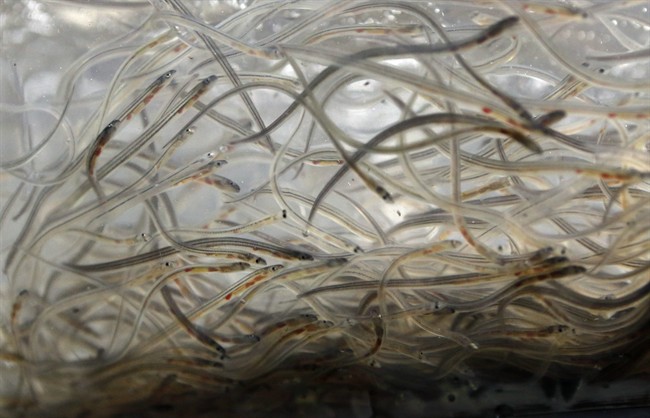The lucrative baby eel fishery in Nova Scotia and New Brunswick has been temporarily shut down because of disputes between fishermen and the possibility of overfishing.

Fisheries and Oceans Minister Bernadette Jordan issued a ministerial order late last month putting a 45-day hold on fishing for eels less than 10 centimetres in length.
The order, dated April 27, states that an unexpected rise of people fishing for eels outside the commercial fishery created the chance of exceeding catch limits.
It also notes there were disputes between fishermen that required DFO officials and police to intervene.
“Conflict on the water between harvesters has escalated to threats of violence and the safety of the harvesters is at risk, which constitutes a threat to the proper management and control of the fishery,” the order states.
READ MORE: Fisheries in Atlantic Canada anxious as they await federal aid package

Get breaking National news
Baby eels, or elvers, are sold to fish farms in Asia where they are grown to market size.
Prices hit a high of more than $2,000 U.S. per pound in 2018, but are significantly lower this year because of the worldwide slowdown in the seafood industry as a result of the COVID-19 pandemic.
“To ensure the conservation of the species, it is imperative that fishing of elvers stop immediately in order for the Department of Fisheries and Oceans to review the management and conservation measures for this fishery,” the order states.
Department officials did not release specifics details of the conflicts between fishermen, but said the investigation continues.
“Compliance monitoring and enforcement activities are ongoing. No charges have been laid at this time,” Debbie Buott-Matheson, a spokesperson for the department, said in an email.
“As a matter of course, potential charges in any fishery are referred through the Public Prosecution Services of Canada and become public record, once laid,” she wrote.
READ MORE: Nova Scotia agrifood groups hail federal support package as a good first step
Representatives of the elver fishery were not immediately available for comment.







Comments